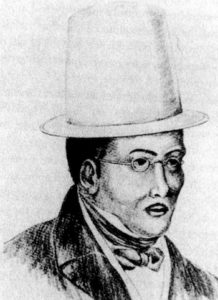
David Ruggles
*This date celebrates the birth of David Ruggles in 1810. He was a Black abolitionist, protest leader, and writer.
From Norwich, Connecticut, Ruggles moved to New York City at age 17, where he began working in several small businesses. Reasonably successful, his primary work in life, however, was the abolition of slavery. One of the most radical men of his time, Ruggles advocated self-reliance and felt those “who would be free, themselves, must strike the first blow.” He dedicated himself to helping anyone who wished to do this.
In 1831, he was an officer of the New York City Temperance Society, declining to carry alcoholic beverages at the grocery store he owned. In 1834, he was one of five Negro agents of 'The Emancipator' and was widely known as its general agent for the New York City area. This publication was the official organ of the American Antislavery Society until 1840. Ruggles published six articles that explained to Negroes their stake in the paper's success.
In 1835, he was one of 400 delegates who attended a meeting to organize the New York Antislavery Society branch. He was the editor of the first Black magazine, 'The Mirror of Liberty,' which appeared in 1838. Ruggles helped more than 1,000 fugitives escape on the Underground Railroad. The New York Committee of Vigilance, of which he was secretary and a general agent from 1835-1839, worked to help fugitive slaves establish themselves in their new locations.
Ruggles gave personal support to hundreds of runaways, including Frederick Douglass. He sheltered Douglass for nearly two weeks, made his marriage arrangements, and then sent the newlyweds to Massachusetts with money and a letter of introduction to a prominent Negro abolitionist there. He believed that slaves in the North were slaves to the community rather than to individuals, and he fought that personally, boarding ships searching for slaves who were being smuggled. Since imported slaves in New York could be freed after a nine-month residency period, Ruggles went door to door in wealthy areas inquiring about the length of residence of domestic workers.
If a fugitive slave were recaptured, Ruggles would be present in the jails and courtrooms during their trials as a form of public awareness regarding what happened to them. In 1841, he refused to sit in the "Blacks-only" section of a steamer headed for Nantucket. A month later, he boarded a "White car" at the railway station, was dragged off, and filed a lawsuit against the company. This provoked other anti-discrimination suits, unfavorable publicity, and acts of civil defiance by others. Ruggles was jailed many times before he was thirty years old, and these experiences finally broke his health, affecting his vision.
He underwent hydrotherapy at the Northampton Association of Education and Industry in Florence, Massachusetts, which temporarily relieved his blindness. Soon thereafter, he began a new career as a hydrotherapist in Northampton, Massachusetts, treating celebrated individuals such as Sojourner Truth and William Lloyd Garrison. His reputation as a hydrotherapist gave him prominence that rivaled his stature as an abolitionist.
He continued to be involved in civic and racial affairs. David Ruggles died in Florence, Massachusetts, on December 26th, 1849.
Encyclopedia of African American Culture and History
Volume 1, ISBN #0-02-897345-3
Jack Salzman, David Lionel Smith, Cornel West